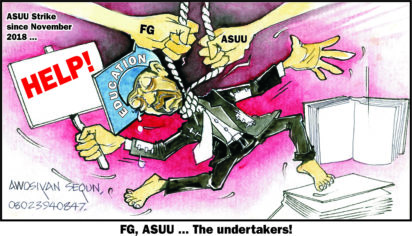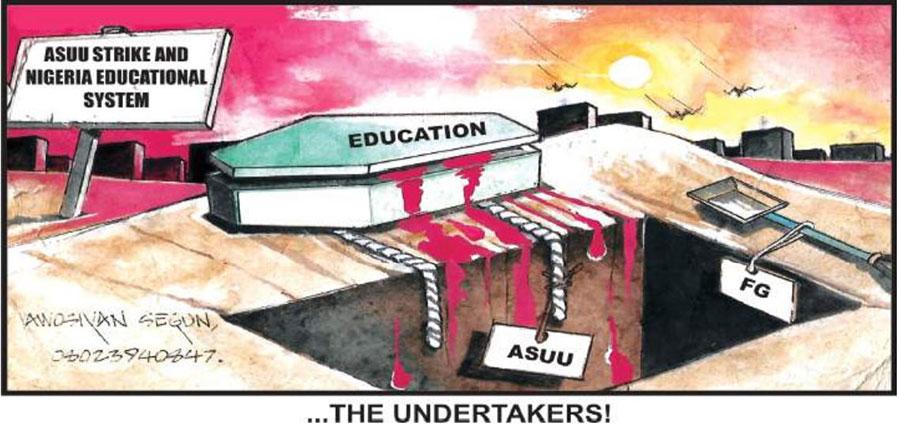Education in its entirety can be placed pari passu with words such as liberation, empowerment, sophistication and optimization. This is because the potency of education towards improving and upgrading the human mind to better fit into, or cope with the dynamism and complexity of the society is next to none.

Many nations around the world have harnessed the potentials of education optimally, and this has paid off, as they’re at the zenith point in terms of innovations and advancement in terms of research, economy and a liberated citizenry.

The nation Nigeria, sarcastically termed the “giant of Africa,” is unfortunately in the dark amongst the list of nations which are reaping tremendously from the dividends of a quality educational system and structure.
The government of the day channels funds to arms procurement and equipment of the armed forces as a way of checking the ever rising chaos of insecurity in the country. Governments and authorities in the country fail to realize that education is a more effective tool in fighting crime, than punitive measures, deterrence, and force. Also, an educated mind can seldom be brainwashed with religious idiosyncrasies that tend to portray members of other religion as not worthy of living.
The education sector in Nigeria is sadly in a mess. Compared with global best practice and standard, it is nothing to write home about. Little wonder what the future holds for our youths and posterity as regards competing favorably with counterparts in the global space. It is absurd to note that an incredible proportion of Nigerian ‘university’ graduates would develop cold feet in giving a public speech, submitting opinions on issues of public concern, or partaking actively in critical discourse without first being induced by Dutch courage.
The education sector in Nigeria needs refining and revitalization from the basics up to the tertiary institution levels. At the basic levels, public primary and secondary schools are already decayed. Only “unity schools” are still at an average reckoning in terms of infrastructure and standard. For basic education in the country, all commendations go to private institutions which have done fairly well in terms of keeping primary and secondary education moving with some level of standards. The only challenge is that standard private schools (primary and secondary) are readily not affordable for children of the ‘have nots’. Only the bourgeoisies enjoy the privilege, whereas, education is said to be a fundamental right for all.
At the tertiary education level, the constant crisis between the government and the Academic Staff Union of Universities (ASUU), has rather become a tradition and norm. With industrial actions (strike) disrupting academic activities on yearly basis. Recall that in 2013, the ASUU, embarked on a six-month strike (17th December – June, 2014), leaving tertiary education in the country completely shattered. Also in 2020, ASUU embarked on its longest lasting strike notable in history. Occurring amidst the Covid 19 pandemic, the strike lasted from (March – November, 2020), making a period of nine months (Vanguard, 14th February, 2022). This misnormal, thereafter became a frequent recurring phenomenon in the county’s education history. Even at the time of filing this discourse, the ASUU is on an industrial action (strike), whose end is nowhere in sight. It is saddening that many Nigerians with any slight opportunity, would opt for educational tourism even in inferior countries of Africa and beyond. Seldom ever, is it heard of foreigners coming into the country to tap from our wealth of knowledge in terms of formal education, and ultimately contributing to our revenue generation.
The government would be quick to fault the decayed educational status of the country on paucity of funds, whereas, millions of dollars are expended daily on white elephant projects. Politicians also would rather embark on projects that would bring immediate glory to them, than those with long term, lasting, and paramount benefits.
The delapidated educational state has held Nigeria at a standstill over the years. Little wonders why compatriots on educational tourism in advanced foreign nations are recorded to excel and perform incredibly better than even citizens of those countries. The likes of Philip Emeawele, Ngozi Okonjo Iwealla, Wole Soyinka, to mention a few, wowed the world with their intelligence in foreign universities, because apparently, the climate of education within the country (Nigeria), has not given them a platform to explode.
Recommendations
The federal government should call for a national conference of veteran educationists across states of the federation, to submit their perceptive opinions as regards the challenges bedevelling the education sector, and as well proffering solutions towards remedying the issues.
A requisite measure towards revamping the educational sector is improved funding. This can be done strategically to ensure sustainability and efficiency. This can be done in numerous ways:
Funds generated and remitted by academic institutions/agencies (such as JAMB, WAEC, NECO etc) into the national treasury, should be reabsorbed, reinvested directly into the educational sector. Note that in 2021 alone, in a press statement as reported by TheGuardianNews (3rd November, 2021), the Joint Admission and Matriculation Board (JAMB) registrar; Prof. Is-haq Oloyede was quotted to have disclosed that the JAMB made a remittance of N3.5 billion to the national treasury as part of its operating surplus for that year. This followed over N7 billion remittance made in 2019 (ICIR, December 2019). All of these funds if channeled back to the education sector, would go a long way towards revitalizing the system.
Government at various levels should prioritize education in Nigeria. If education is deemed pertinent, sufficient funds would be made available to sustain the sector and keep it at optimal state.
Education should be subsidized in the country, such that would afford the less privileged, opportunity to access education to any level of their dreams.
Also, grants and scholarship programs should be created to reward exceptional students for their efforts, and also instill in the minds of the youths and minor, the need to rely on knowledge acquisition, skill, and education for a brighter future, rather than cybercrime (yahoo) and fraudulent activities of all sort which has become, sadly, a trending lucrative venture amongst our supposed leaders of tomorrow: the youths.
Onojah Emmanuel Onogwu





















Then take control and back up onto it priligy buy online usa